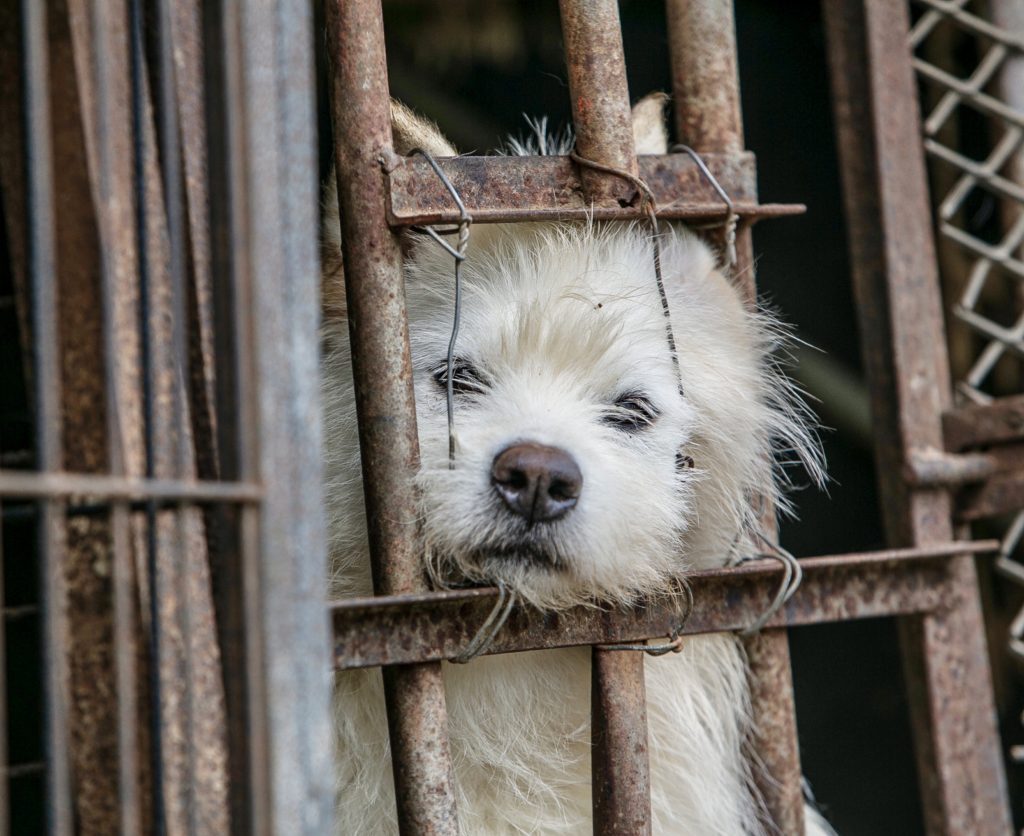China’s Ministry of Agriculture and Rural Affairs has for the first time ever explicitly stated that dogs are companion animals and not “livestock,” in what could potentially be a game-changing moment for Chinese regional governments to follow the lead of Shenzhen city and ban the eating of cats and dogs, says long time anti-dog meat campaigners Humane Society International.
The draft document of the National Catalogue of Livestock and Poultry Genetic Resources was published by the national government on April 8th, which is currently accepting input from Chinese animal protection groups on the policy. It provides a list of animals considered “livestock” including pigs, ducks, chickens, and others, but omits dogs and cats. The livestock list proposes the only species that can be traded for meat, and the Ministry provides the first ever explanation for their omission, saying in a statement:
“With the progress of human civilization and the public’s concern and preference for animal protection, dogs have changed from traditional domestic animals to companion animals. Dogs are generally not regarded as livestock and poultry around the world, and China should also not manage them as livestock and poultry.”
Dogs and cats have never been listed as “livestock” before, but the national government in China has never officially commented on their omission until now. Coming so soon after the city of Shenzhen became the first city in mainland China to ban the consumption of dogs and cats, Humane Society International is hopeful that this could signal a critically important shift in China’s desire to see an end to the dog and cat meat trade.
Shown here are a few of 19 dogs that were rescued from a local trader.
Dr. Peter Li, China policy specialist at Humane Society International, said: “This is the first time we’ve ever seen China’s national government explain that dogs are companion animals. Recognizing that dogs hold a special bond with humans is an essential first step towards eliminating the consumption and trade in dog meat. This could be a pivotal moment that provides encouragement for other cities across the country to follow Shenzhen’s lead to ban the eating of dogs and cats.
“Companion animals have never been part of China’s culinary mainstream, and certainly most people in China want an end to the theft of their companion animals for a meat trade that only a small percentage of the population indulge in. Tens of millions of dogs and cats every year, mostly stolen pets, suffer for the meat trade which is almost entirely fuelled by crime, and perhaps most significantly right now, poses an undeniable human health threat with the risk of diseases such as rabies and cholera.”
The proposed livestock list also includes a variety of farmed wildlife species such as Sika deer, red deer, reindeer, alpaca, ostrich, as well as species typically farmed in the millions in China for the global fur trade, specifically: mink, silver fox, blue fox, and raccoon dog.
Dr. Teresa Telecky, Vice President of Wildlife at HSI, said: “Listing wild animals, including foxes and raccoon dogs, as ‘special livestock’ is concerning. Rebranding wildlife as livestock doesn’t alter the fact that there are insurmountable challenges to keeping these species in commercial captive breeding environments, and that their welfare needs simply can’t be met. In addition, there’s clear evidence that some of these species can act as intermediate hosts of viruses, such as COVID-19, which is why we’re urging governments around the world to stop trading in wildlife.”
Facts about China’s dog meat trade
-
30 million dogs a year are killed across Asia for their meat. There are estimated to be more than 91.49 million dogs and cats kept as pets in China. An estimated 10 million dogs a year are killed for China’s dog meat trade.
-
The World Health Organization warns that the dog meat trade spreads rabies and increases the risk of cholera.
-
Most people in China don’t eat dogs, in fact dog meat is only eaten infrequently by less than 20% of the Chinese population. A 2017 survey revealed that even in Yulin, home of the notorious dog meat festival, most people (72%) don’t regularly eat dog meat despite efforts by dog meat traders to promote it. Nationwide across China, a 2016 survey conducted by Chinese polling company Horizon, and commissioned by Chinese group China Animal Welfare Association in collaboration with Humane Society International and Avaaz, found that most Chinese citizens (64%) want to see an end to the Yulin festival, more than half (51.7%) think the dog meat trade should be completely banned, and the majority (69.5%) have never eaten dog meat.
-
Shenzhen’s food safety legislation (Shenzhen Special Economic Region Regulation on a Comprehensive Ban on the Consumption of Wild Animals) was first proposed in February by Shenzhen legislators, and comes into effect on May 1st. (Article 3) makes clear that the consumption of “pet” animals such as cats and dogs is not permitted.
